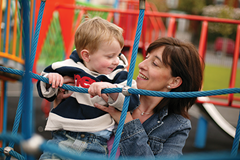Commitments to children
 Slow progress has been made on the Programme for Government’s pledges on education and child health.
Slow progress has been made on the Programme for Government’s pledges on education and child health.
The Executive governs one of Europe’s youngest populations. The 2011 Census recorded 430,763 children (aged under 18) in Northern Ireland, representing 23.8 per cent of the population.
Stormont’s Programme for Government technically covers 2011-2015 but effectively applies to 2012-2015 as it was finalised by the Executive in March last year. Three commitments referred to children in general terms:
• deliver a range of measures to tackle poverty and social exclusion through the Delivering Social Change framework (to include an improvement in children and young people’s health, well-being and life opportunities);
• introduce a package of measures aimed at improving safeguarding outcomes for children and vulnerable adults; and
• improve patient and client outcomes and access to new treatments and services (including the long-term outcomes for the children of teenage mothers from disadvantaged backgrounds).
Delivering Social Change incorporates the £20 million Social Protection Fund (ongoing winter hardship payments) and the £80 million Social Investment Fund. The latter fund was first proposed in December 2010 but has not yet been established due to delays in drawing up area plans. £20 million was allocated for 2012-2013 but will be now carried over into the new financial year. The fund is overseen by OFMDFM.
The framework also includes two high profile announcements made by the First and deputy First Ministers in October but progress has since been slow.
Ten new ‘family support hubs’ will be established in 2013, with a focus on improving parenting in deprived areas; 17 already exist. The ministers also announced that 230 graduate teachers would be employed in one-to-one tuition. Recruitment will take place in May and June.
On safeguarding, the Department of Health, Social Services and Public Safety (DHSSPS) was tasked with publishing a domestic and sexual violence and abuse strategy by April 2013. This is now due later this year.
The third commitment involves rolling out the family nurse partnership programme from one test site to another test site in 2013-2014. The initial test in the Derry, Strabane and Castlederg areas has involved 100 teenage first-time mothers since 2010.
Asked why just one new test site was proposed, the DHSSPS explained that this was set out in the original licence agreement but added that a third site “may also be included.” The programme offers intensive and structured home visiting, delivered by trained family nurses, from early pregnancy until the child is two.
Several Programme for Government commitments cover education in schools. The Executive aims to increase the proportion of young people achieving at least five GCSE passes (A*-C, including maths and English). 59.5 per cent of pupils attained this level in 2010-2011. The target for 2011-2012 was 61 per cent and figures for that year will be published in May.
Literacy and numeracy levels should improve among all school leavers, with additional support for under-achievers. Recent action in this area has included the Education Works advertising campaign and a project to help teachers improve reading skills among children with learning disabilities.
Ministers have also pledged at least one year of pre-school education for every family seeking that. In 2012-2013, almost all children who completed the pre-school application process (99.8 per cent) were offered a funded place; 84 per cent received their first preference.
The Department of Education “can never guarantee that parents will secure a place at their preferred setting,” a spokesman said but it encourages parents to “express preferences for a number of settings” and “carefully examine” the admissions criteria for those settings.
An advisory group on shared education was set up last July and is due to report back to the Minister in February. The Education and Skills Authority (first proposed in 2005) is due to be established in 2013. The Assembly’s Education Committee is due to report on the Bill by 8 April and the remaining stages may pass before the summer recess.





